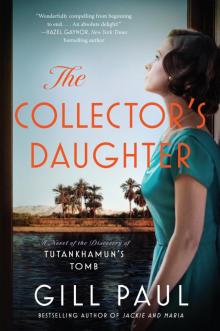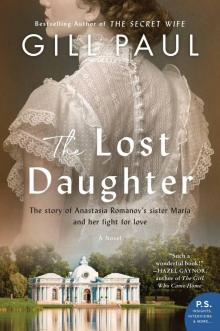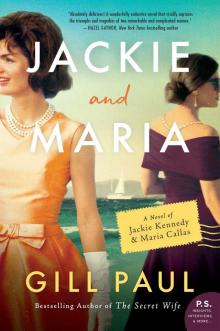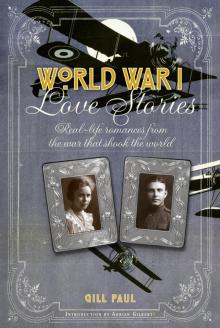The Secret Wife Read online
Page 31
Dmitri picked up the mail from the kitchen table, knowing he would be unable to look her in the eye while telling an outright lie. ‘I had a long meeting with a wholesaler. He took me for lunch.’ He tore open an envelope but stared without focus at the letter inside, while he waited to see if Rosa had any more questions.
‘It’s chicken supreme for dinner,’ she said. ‘Nicholas called to say he’ll come home on Friday evening and he’ll stay till Sunday. I hope Marta can come too but you know what her social calendar is like! We’ll be lucky if she can squeeze us in for a lunch.’ She laughed, proud of her gregarious daughter.
‘Good. Well, that will be nice.’ Dmitri seemed to have got away with it this time but he was useless at dissembling. This is where the arrangement would fail: he had never been good at telling lies. Rosa had believed his excuse today but what about next time? And the time after that? Would Tatiana become impatient if she didn’t see enough of him? He realised Rosa was talking and he wasn’t listening because his head was full of the problem of loving two women and not wanting to hurt either of them.
It was relatively simple on a practical level for Dmitri to see Tatiana on weekdays. He could slip out of the office, ostensibly for a meeting, or use the time when Rosa had engagements: she volunteered at the local hospital, attended a weekly flower-arranging class, and often went for coffee with friends. At weekends, he could use the excuse of taking the dog for a long walk, but more than once his plans were thwarted when Nicholas or Rosa decided to accompany him.
Dmitri usually drove to Tatiana’s cottage in his Lincoln Continental Cabriolet. Physically, he could be there in ten minutes, but it was harder to make the mental adjustment from one woman to another because he was a different man with each. With Tatiana he discussed literature, politics and history, while with Rosa he talked of their children and mutual acquaintances and they laughed at lot. He was utterly besotted by Tatiana, just as he had been in the old days – she was the creature of his fantasies, his great love – but sometimes when he was with her he found himself thinking of Rosa’s indomitable cheerfulness. When he was at home with Rosa and his thoughts turned to Tatiana he flushed to the roots of his hair at the strength of his feelings. Rosa had been a wonderful mother and companion but she would never be his soulmate; she would never totally understand him because she did not share his Russian heritage.
Tatiana was different from her teenage self. She seemed strong and self-reliant now, quite content with her own company. She never asked that he visit her more frequently but was always pleased to see him when he arrived. There was no sign of her making friends in the neighbourhood; she seemed to live a solitary life when he was not around, working on the translation of his novel or cultivating her garden. She had furnished the cottage in a simple, functional style, devoting all her creative energy into growing vegetables, herbs and flowers in the little twenty-foot by twenty-foot yard out back. He was surprised to find that she could cook now.
‘Do you remember when you were learning to make bread?’ he asked. ‘I was shocked that a grand duchess should have to do such a thing.’
‘That was in Tobolsk …’ Her voice trailed off and a haunted look came into her eyes. Dmitri knew she was thinking of her family.
‘I have your diary,’ he said. ‘The one you left in my cottage. Would you like to see it?’
‘Never.’ She shuddered. ‘No.’
‘And I still have the waistcoat you knitted for me that Christmas,’ he told her, ‘but it is a little snug around my middle.’
‘I have done a lot of knitting since then,’ she said, ‘and made my own wool too. We kept sheep.’
She let slip odd facts from time to time and he stored them up, putting the pieces together. Still there was much she wouldn’t talk about – the night she disappeared from the cottage, how she got back to Czechoslovakia, her dead son Jaroslev – but he would never push her. Frankly, he wasn’t sure he wanted to know, at least not for a while. He was still trying to find his balance in this strange seesaw life he had created.
Chapter Fifty-Nine
London, 15th October 2016
London was drizzly and overcast when Kitty arrived at Heathrow. She shivered and wrapped her green cardigan tightly around herself. There wasn’t a chink of sunlight, just solid grey cloud cover, like a lid closed over the city. She missed the colours of Lake Akanabee. Even in wild weather it had been like an artist’s palette of pinks, purples, greens, reds, gold, and every shade of blue.
She caught a train into the centre of town then took a taxi to Crouch End, fumbling in the bottom of her case for door keys. There was a moment of panic: Tom wouldn’t have changed the locks, would he? What if he hadn’t gone to work yet but was sitting at the kitchen table – or upstairs, still in bed?
The door opened and the first thing she saw was a neat pile of post addressed to her on the hall table. It felt as though she was an intruder. Everything was clean and orderly, and the air smelled of furniture polish. It was as if the house had been uninhabited since she left.
She went to the kitchen and made a cup of tea, glancing into the fridge as she took out the milk. There wasn’t much fresh food, but the freezer was full of ready meals and that made her sad. Poor Tom.
She dozed on the sofa for a couple of hours then began to unpack the clothes she’d taken to America and lay out the ones she would take to Brno. As six o’clock approached she had butterflies at the thought of meeting Tom, and smiled at herself. Would they make love that night?
She arrived at the park early and stood beneath the shelter of an oak tree, wanting to watch Tom as he approached the bandstand. Even from a distance she could tell he had lost weight. His jacket hung loose and he’d forgotten to bring a raincoat or umbrella so was getting soaked in the drizzle, but he was valiantly carrying two takeaway coffees as well as his briefcase. She felt a pang of love for him.
When she stepped out to say hello, she saw his eyes were rimmed by shadows. There was a moment when they both held back then she leaned in to give him a kiss on the cheek before taking one of the coffees.
‘You look tired,’ she said. ‘Are you OK?’ She had done this to him; it was her fault he was so thin and grey. And then she remembered what he had done to her by sleeping with Karren. Suddenly it seemed like ancient history, something that had happened in another lifetime.
‘It’s good to see you looking all tanned and beautiful, Kitty-kat. Your summer on the lake obviously suited you.’
‘The cabin is gorgeous. You’ll have to …’ She stopped. They weren’t there yet.
They sat on the wrought-iron bench inside the bandstand, where Hula-Hoop packets and Irn-Bru cans littered the ground, and she took a sip of her coffee: a soya latte. He knew what she liked.
‘You were right,’ she began. ‘There was a lot of work to do. It was covered in creepers and had a tree growing through the steps when I arrived, but it’s all fixed up now.’ She showed him some photos she’d taken on her phone. ‘I had to rebuild the porch and the jetty from scratch. I made that swing seat as well.’
‘What a beautiful spot.’ He scrolled through the pictures. ‘So is that what you’ve been doing all summer? Working on the cabin?’
‘I’ve also been finding out about the great-grandfather who left it to me. There are lots of gaps in his story but I’m flying to the Czech Republic tomorrow to meet someone who can tell me more.’ Tom looked alarmed so she added quickly: ‘Just for the weekend.’
‘Will you come back to our house tonight?’ She had never heard him sound so unsure of himself.
‘I took my bags there this morning. Was that all right?’
‘Of course.’
They were like strangers. Kitty decided to cut through the formality. ‘I’m sorry I haven’t been in touch. I needed space to think. Not just about us; I needed to try and work out what I’m doing with my life.’ She gave a little laugh. ‘I suppose I want to find a sense of purpose. Other people have children and that gives them a fo
cus but we decided against them. Now I want to find a way for my life to mean something. Does that make sense?’
He was listening closely. ‘If you want to put the children issue back on the table we can discuss it.’
‘No, not really.’ She looked into his eyes, trying to read his expression. ‘Unless you do?’
‘I thought about it this summer, but mainly because if we’d had kids you wouldn’t have been able to leave me for three months without any communication. It’s been horrible, Kitty. I felt as if I was emailing into a black hole but I couldn’t stop because it was the only slender hope I had of getting through to you. Were you reading my mails?’
She gave a guilty shake of the head. ‘I read your letter. It made sense.’ Suddenly she badly wanted to kiss him. It felt too soon, though. ‘Are you still looking for a new job?’
‘I had an interview last week with a company that raises funding for the arts and I just heard two days ago that I’ve got the job.’ He looked boyish in his excitement. ‘They’re based in Shoreditch in a converted factory. I love the atmosphere and the people there.’
‘That sounds brilliant! Congratulations!’ She grinned at him. ‘What will you have to do?’
He described the role, and Kitty thought how perfect it sounded for him to become an enabler for artists, someone who would help them achieve their dreams.
‘Did you do any writing over the summer?’ he asked.
She sighed. ‘Not a word. I’m beginning to realise I’m not cut out to be a writer. Sure, I can string a sentence together but I don’t have anything I passionately want to say. That’s why I keep abandoning everything I start. My great-grandfather, on the other hand … he was a famous novelist in his day. His books are powerful insights into human emotion.’
He was regarding her affectionately. ‘You never mentioned having a writer in the family.’
‘No one ever told me. I can’t think why Mum never said.’
‘It seems odd, but I remember her saying she never met any of her grandparents: all four died before she was born …’
‘Did she?’ Kitty screwed up her forehead trying to remember. ‘But that’s not true. Dmitri only died in 1986. It seems there was some big falling out between them. That’s why Dmitri’s inheritance eventually came to me; they couldn’t find any family members when he died.’
‘Is this why you are flying to the Czech Republic? So you can solve the mystery?’ He smiled indulgently.
‘I’ll tell you more about it over dinner. Can we go and eat now? I’m starving.’
They walked to their favourite restaurant, a tiny French bistro two streets from home, and first she told him what she had learned about Dmitri Yakovlevich. They ordered their usual – French onion soup, pepper steaks and a bottle of Burgundy – and never stopped talking throughout the meal. There was so much to say.
‘If you have decided that you don’t want to be a writer any more, then what?’ Tom asked.
‘I don’t know. I didn’t get that far.’
‘If you want to develop another property, we could easily raise money against the house.’
Kitty wrinkled her nose. ‘I don’t know. It’s stressful, and there are tedious problems. Besides, I’m not sure the market is going in the right direction. There could be a crash on the way.’
Tom was watching her, eyes narrowed. ‘Show me those photos of your cabin again.’
She handed him her phone and he flicked through them once more. She’d taken long shots from the end of the jetty, and also some close-ups of the stairs and banister leading up to the porch.
‘I know what you should be,’ he said, handing the phone back to her. ‘A carpenter.’
She opened her mouth to object then stopped. She loved working with wood. ‘But how would I earn a living at it?’
‘That’s up to you. You could set up a website and distribute leaflets offering to make bookshelves and fitted cupboards … or you could design your own bespoke furniture. Why not?’
She frowned. ‘I’d need to upgrade my tools. I’ve already got contacts in that wood yard in Kentish Town. Perhaps I could build a shed at the end of our garden as a workshop.’ Tom let her think out loud, nodding encouragement. She had the strangest sensation as all the pieces slotted into place. It was as if it was predestined. This was one of the extraordinary things about a close relationship: it was possible for your partner to know you better than you knew yourself.
‘Mum wouldn’t have approved,’ she said. ‘She wanted me to be a lawyer.’
‘Maybe, but most of all she wanted you to be happy.’
Kitty knew that was true, and loved that Tom knew it as well. He provided continuity in her life now that he had become her sole family member. She had drunk two glasses of wine and was about to pour another when she stopped, remembering her great-uncle Nicholas and his cirrhosis. Tom didn’t want any more either, so they put a cork in the bottle and carried it home.
Once they were in the hall, she grabbed the collar of his jacket and pulled him in for the kiss she’d been wanting to give him for the last few hours. ‘I’m sorry,’ she whispered, and she meant she was sorry for leaving him alone all summer. He didn’t reply, too busy lifting her sweater over her head. She unfastened his trousers, lifted her skirt and pushed her knickers aside then stood on tiptoe and hooked one leg around his waist so he could enter her. Now, she thought, now at last I am home.
Chapter Sixty
Albany, New York State, 1955
Dmitri’s double life continued for seven years and neither of the women he loved challenged him. Tatiana never seemed to resent the fact that he spent most weekends and holidays with his family and sometimes couldn’t see her for days on end; Rosa never questioned his whereabouts, just accepting whatever excuse he made to explain a few hours’ absence. On the drive home from Tatiana’s he often stopped for a beer to clear his head. Guilt had become a familiar companion but he still believed there had been no choice: he couldn’t have left Rosa, the woman who had entwined her fortune with his and brought him so much happiness, but at the same time he couldn’t resist the potent magnetism of his decades-old bond with Tatiana.
During those seven years, both of his children got married. Nicholas had never brought home any girlfriends and by his late twenties they were beginning to worry about him until one weekend he presented a long-legged, sun-kissed Californian girl called Pattie and announced they were engaged. The whole family flew out to Santa Barbara for a wedding in Pattie’s home church, followed by a party at her parents’ glamorous beach club. At first Dmitri and Rosa were dazzled by the champagne cocktails, the palm trees set around a turquoise swimming pool, and the glitzy people wearing ostentatious jewellery, but Rosa was soon circulating and befriending their new in-laws. She was wearing a rose-pink lace off-the-shoulder dress with a mauve satin sash, and a tiny hat decorated with pink and mauve fresh flowers and in Dmitri’s opinion was by far the best-dressed woman at the gathering.
Marta had brought one of her many boyfriends as her ‘plus one’: a staid, prematurely balding Englishman called Stanley who owned a company that manufactured silver cutlery. He had a strange accent from somewhere in the north of England, and Dmitri found it hard to make out what he was saying. After a while it became awkward asking him to repeat himself, so he nodded and smiled vaguely whenever they were forced to make conversation. Marta obviously had no such difficulty because a few weeks after the Santa Barbara wedding, Stanley came to ask Dmitri’s permission to marry her.
Dmitri hesitated. ‘Of course, it is my daughter’s decision, but I hope you do not plan to take her back to England with you. My wife and I would miss her terribly.’
‘Naw, I’m going to be here awhile,’ Stanley promised. ‘America’s the fastest-growing market in’t cutlery trade and we’ll most likely set up home near Albany.’
‘And you think you can keep my daughter and any children you might have in comfort with your earnings from this business?’
Stan
ley launched into a speech about profit margins and the potential growth of the company, and Dmitri stopped concentrating. He wasn’t sure what Marta saw in this man, who was no more than average-looking, but perhaps she liked the foreignness of him. When he discussed it with Rosa later, she said he treated Marta like a princess but Dmitri couldn’t see how. At any rate, the marriage went ahead, in a church in Albany, followed by a reception for eighty guests in a swish restaurant. After the meal, a swing band played and everyone crowded onto the tiny dance floor. Dmitri and Rosa held each other and swayed to the unfamiliar beat.
‘We’ve done our duty as parents.’ She smiled. ‘Now I look forward to being a grandma.’
The thought hadn’t even occurred to Dmitri and when he considered it he felt sad that he and Tatiana had not been able to have a child together. His direct bloodline would continue into the future but Nicholas and Alexandra’s would not.
Just after Marta’s wedding, Dmitri’s dog, Malevich, fell ill. His belly swelled up and he was in obvious pain, pressing his head against the wall and whimpering. A vet was called, who told them the liver had failed and there was nothing he could do. Dmitri held Malevich’s head in his hands, looking into those trusting brown eyes, as the vet administered a fatal injection. Once the dog stopped breathing he put his arms around him and sobbed into his coat. His head filled with images of all the friends he had lost, of his parents, of Tatiana’s family. He thought of the concentration camps where many German friends had died; of the hard-labour camps in Siberia. Why was life so relentlessly brutal, just one challenge after another? Why did evil so frequently triumph?
For a while it seemed as though losing Malevich, the dog who had alleviated his depression at the onset of war, would tip Dmitri into another full-scale episode. The old symptoms returned: a feeling of uselessness, believing that there was no point in getting out of bed, or dressing or shaving. Senator Joe McCarthy’s Subcommittee hearings to root out Communism had begun to take on the repressive nature of the very ideology they opposed and Dmitri feared he might be forced to leave America, the land that had become home. He went to Tatiana’s house two or three times a week but was taciturn and moody with her. When she tried to make him talk about it, he growled at her to leave him alone and she shrank back, unprepared for this new side of him.

 The Collector's Daughter
The Collector's Daughter The Lost Daughter
The Lost Daughter Jackie and Maria
Jackie and Maria The Affair
The Affair Love...Maybe
Love...Maybe The Secret Wife
The Secret Wife No Place For a Lady
No Place For a Lady Another Woman’s Husband
Another Woman’s Husband World War I Love Stories
World War I Love Stories World War II Love Stories
World War II Love Stories